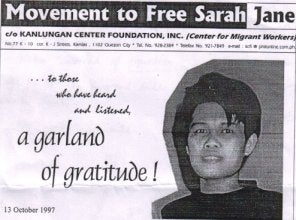| HRW Documents on Saudi Arabia | FREE Join the HRW Mailing List |
|
The Case of Sarah Jane Landicho Dematera |
Sarah did not speak Arabic and had very limited fluency in English, so she was unable to explain anything to the victim's husband when he returned home. He called the police, who questioned Sarah three times and then told her that they believed she was the murderer. Sarah reportedly insisted on her innocence, but was held for one week in solitary confinement and subjected to continuous sleep deprivation. At the end of this week-long ordeal, Sarah was brought to an office, given a blank notebook, and instructed to write down in English what senior officers - presumably interrogators from the interior ministry -- dictated to her. Terrified and weak, she complied but stopped writing when the narrative reached her own admission to the murder. When she protested, she said that she was told she would be electric-shocked and brought to court if she did not "confess." Sarah was returned to the police station where she was arrested and was forced to sign the notebook that contained her "confession." The police then took Sarah to the house of her employer and asked her to re-enact how her employer's wife had been killed, videotaping her as she told the story. She was returned again to the police station and then transported to the women's prison in Dammam, where she was held for one year in solitary confinement. Sarah's trial took place on October 4, 1993 and October 11, 1993 in Islamic Court No. 39/4, according to the Saudi foreign affairs ministry. Sarah did not have a lawyer or an interpreter, and Kanlungan believes that Philippines consular officials did not have access to her during these proceedings. The videotaped reenactment of the murder was used during the trial, Sarah informed her mother during a visit in 1998. Kanlungan has emphasized that Sarah "was not given a chance to explain clearly what she witnessed, and how she saw the man kill the Madame, because she could not speak Arabic and was neither fluent in English." It has also raised other concerns: "There was no interpreter or lawyer to assist her during the trial and she did not have enough skills to present the facts of her case. If the videotaped re-enactment of the crime was shown in court, it could have been misinterpreted as [acts] that Sarah herself committed. No one from among the police must have clarified that the taped video was just a re-enactment of how Sarah witnessed/saw the man kill the Madame. She did not do it herself, she only re-enacted how she saw the crime happen in front of her own two eyes." The court issued its judgment on November 14, 1993, finding Sarah guilty and sentencing her to death. Kanlungan provided Human Rights Watch with a translated communication from the Saudi ministry of foreign affairs, which stated the following: "The case was decided by the Islamic Court No. 39/4 dated 3/6/1414 (corresponding to Nov. 14, 1993) ordering the execution of said accused as a punishment for the crime she committed. However, the execution of said punishment has been postponed until the minor children of the deceased reach the age of majority to enable them to join with other heirs in requesting for the execution of the accused. The said decision has been confirmed by Royal Decree and sent to the proper higher authorities dated 15/2/1415 (corresponding to July 24, 1994)." Sarah did not have a family visit until February 1998, when a Kanlungan representative and Sarah's mother Josie traveled to Saudi Arabia to meet with her in Dammam women's prison. Mrs. Dematera visited again in November 2001. In February 2003, the Philippines Department of Foreign Affairs sent a written report describing its activities on Sarah's behalf. It noted that consular officials visited her in October 2002 and that she appeared physically healthy. It said the embassy pursued a royal pardon during Ramadan later that year, and was seeking assistance from Saudi lawyers and prominent citizens in the Eastern Province to intercede with members of the victim's family to accept monetary compensation in lieu of implementation of the death penalty. According to Kanlungan, Sarah suffers from depression and requires tranquilizers in order to sleep. Severe backaches in 2002 prevented her from continuing work as a food aide in the prison, depriving her of the income she used to purchase food and phone cards. A Kanlungan representative met with Sarah Jane's mother on May 23, 2003. Mrs. Dematera is worried because she has not heard from her daughter since late January 2003, presumably because the cellphone on which she made regular calls was stolen. According to Kanlungan, written communication with Sarah is difficult because letters cannot be sent directly to the prison but must be routed through the Philippines embassy, which delivers them during occasional visits. Inmates are not permitted to send letters from the prison. Sarah Jane Dematera, who will be thirty-two years old on December 17, 2003, has spent almost one-third of her life in prison in Saudi Arabia for a crime that she possibly did not commit. |
